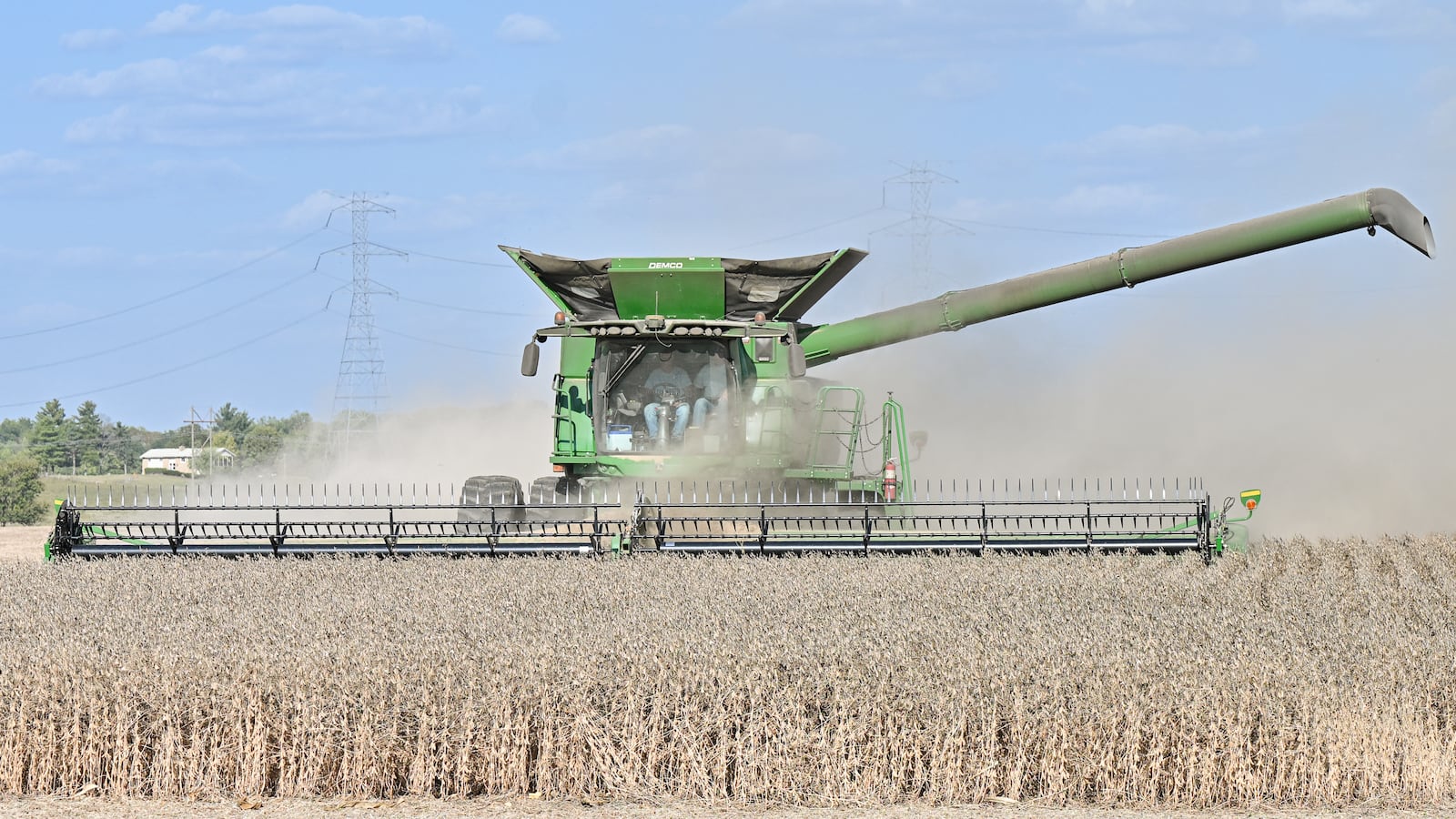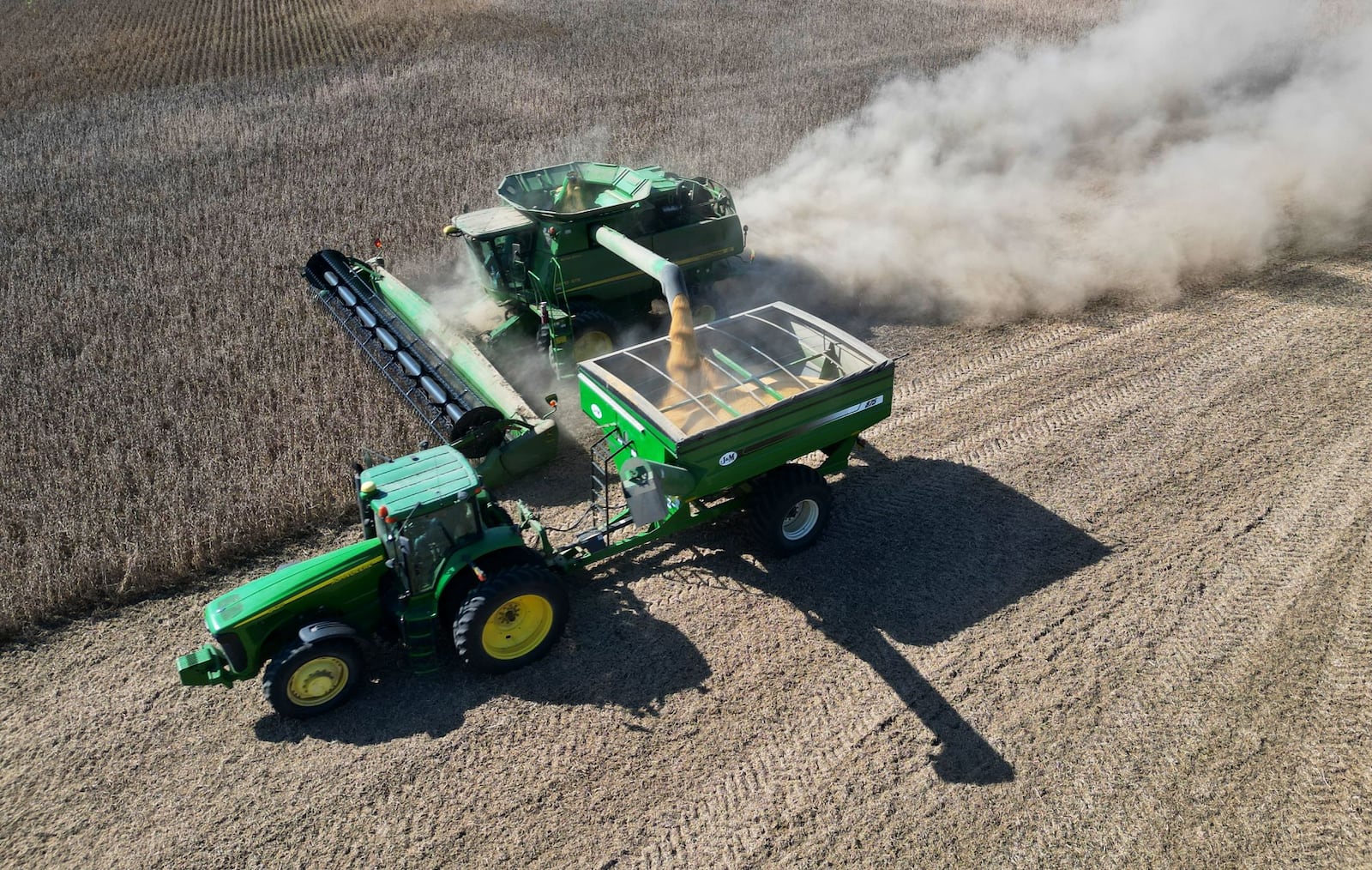Bessent said China will start by purchasing 12 million metric tons of soybeans from the United States between now and January.
The thaw in trade relations between the world’s two largest economies comes after after months of trade-issue turmoil and found U.S. soybean farmers uncertain if they would have a way to sell this year’s crop.
Credit: Bryant Billing
Credit: Bryant Billing
Michael Brehm, a third-generation farmer for 44 years, tends to 3,800 acres of crops in Darke County, with about two thirds of that devoted to soybeans.
Reached by this news outlet, Brehm took a wait-and-see approach to the just-announced trade deal.
“My understanding (is) they haven’t signed it yet, so it’s still kind of speculation,” Brehm said. “If it goes through, that’s what we’ve been waitin’ on and hopefully it’ll make the markets go up, but we don’t know.”
Brian Harbage, whose farm in Clark County’s South Charleston is 50% soybeans, hesitated to proclaim the deal a complete win for the soybean industry.
“Obviously, it’s great, but ... we’re not going to catch up for this year because they haven’t bought any up to this date and now they’re coming to the table late,” Harbage said. “They can’t physically buy enough between now and the end of the year to make up for the losses of this year.”
Harbage said he hopes that trade between the two nations continues to improve and that China eventually returns to the levels it previously purchased from the United States and eventually exceeds that.
Credit: Nick Graham
Credit: Nick Graham
The soybean industry is vital to the state’s economic health, generating approximately $3 billion annually in direct sales and contributing an estimated $8 billion in indirect economic impact, according to Ohio Soybean Association.
“I think farmers are encouraged by the announcement of the deal,” said Brandon Kern, deputy executive for Ohio Soybean Association and Ohio Soybean Council. “It’s certainly a step in the right direction in terms of returning back to a sense of normalcy in the marketplace. If these purchases come to fruition, it’s a significant step forward for farmers, that’s for sure.”
American Soybean Association Caleb Ragland, a soybean farmer from Magnolia, Kentucky, said soybean farmers are “extremely grateful” to President Trump for making soybeans a priority in negotiations with China.
“This is a meaningful step forward to reestablishing a stable, long-term trading relationship that delivers results for farm families and future generations,” Ragland said in a statement.
China committing to the deal would put that nation’s purchases back on pace with recent years, when it historically purchased 25 to 30 million metric tons of U.S. soybeans in recent years, ASA said.
USDA data shows China purchased 22.5 million metric tons of U.S. soybeans in the 2024-25 marketing year, which ran from September 2024 to August 2025, according to Politico. It bought 24.3 million metric tons in the 2023-24 marketing year, with prior years seeing purchases exceeding 30 million metric tons.
When U.S. tariffs on Chinese exports spiked in April, China retaliated with its own tariffs and stopped buying soybeans from the United States, getting them instead from other countries like Brazil and Argentina.
Between January and August this year, exports to China have plummeted, with only 218 million bushels delivered, which totaled a little more than 5.9 million metric tons.
ASA said it is encouraged that China’s purchasing commitments are framed as minimums, saying those commitments lay “a strong foundation” to return to traditional volumes over the coming marketing years. It said looks forward to “continued growth in soybean purchases beyond these levels.”
Darke County’s Brehm said he questions if the price at which U.S. farmers can sell soybeans will return to previous levels. Soybean prices neared the $18-per-bushel mark in 2012 and reached $16 per bushel in 2021.
“I’ve got my doubts,” about that much of gain, Brehm said. “Will we get a dollar or two uptrend (in the price), possibly? Yes, I think we should.”
Brehm said what he fears is the price of soybeans increasing by a few dollars and then seed and fertilizer companies raising their prices in response.
“Then it kind of puts us back to square one,” he said. “That’s the whole problem. That’s like when he was talking about another bailout for us, I was sure hoping he wasn’t going to do that, because that was just another license for the fertilizer companies, chemical companies, everybody else, to steal from us, because then they say, ‘OK, they (farmers) got all this money as a bailout, now we don’t have to really be competitive. We’ll just charge what we want.”
Harbage said he hopes China lives up to the yet-to-be-signed agreement and that the United States negotiates for its trading partner to do even more.
“What we need to do is get (China) to buy all their soybeans from us and not from South America,” he said.
Trump posted to Truth Social that he and President Xi agreed on many things during their negotiations, “with others, even of high importance, being very close to resolved.”
“I was extremely honored by the fact that President Xi authorized China to begin the purchase of massive amounts of Soybeans, Sorghum, and other Farm products,” Trump said in the post. “Our Farmers will be very happy! In fact, as I said once before during my first Administration, Farmers should immediately go out and buy more land and larger tractors.”
Reporting from the Associated Press was included in this report.
About the Author


